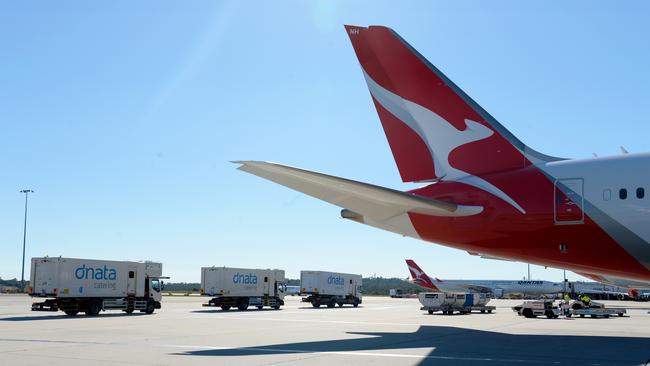Qantas Super partners with Calvert and Goldman Sachs to reduce carbon emissions of portfolio
The $8bn Qantas Super fund has moved to slash the carbon emissions generated by its investment portfolio through a partnership with two of the world’s biggest asset managers.

One of the nation’s largest and best performing corporate superannuation funds, the $8bn Qantas Super, has moved to slash the carbon emissions generated by its investment portfolio through a partnership with two of the world’s biggest asset managers.
Qantas Super, managing the retirement savings of the airline’s staff since 1939, has partnered with Calvert Research and Management and Goldman Sachs Asset Management to reduce carbon intensity across its Australian and global equity portfolios.
Calvert is part of Morgan Stanley Investment Management, the asset management division of the global investment bank.
The $2bn allocation, split equally across the two investment managers, is the latest step in Qantas Super’s journey to achieve its goal of net zero carbon emissions across its investment portfolio by 2050. The move will see a halving of emissions across one quarter of its investment portfolio.
“This is a game changer for us. We see climate change as a risk that we need to manage as well as embracing the opportunities that it also presents. That’s why we embedded sustainability as one of our core investment beliefs in 2015,” said Qantas Super chief investment officer Andrew Spence.
Mr Spence said Qantas Super looked forward to working with Calvert and Goldman Sachs Asset Management to achieve its net zero carbon emissions goal, which will be carried out in three phases.
The first phase targets a 24 per cent reduction in carbon emissions across Qantas Super’s investment portfolio by 2025, from a baseline of 30 June 2020.
“With their long track record in responsible investing, we are sure these partnerships will enable Qantas Super to meet its sustainability goals,” Mr Spence said.
In recent years there has been a sea change in Australia and globally as ESG has come to the fore for investors and corporations.
Australian high net worth and institutional investors are also increasingly pivoting to invest in technologies supporting sustainable and impact investing.
Half of the assets of global investment banking giant Credit Suisse’s bank’s multi-asset class, discretionary portfolio management business are now in ESG compliant portfolios.
The Zurich-based James Gifford, one of the global pioneers of ESG and the head of Credit Suisse’s sustainable and impact advisory arm, said last month that big fortunes would be made by investors that bankrolled technologies to fast-track decarbonisation. Qantas Super believes that climate change adaptation will drive significant investment to decarbonise existing businesses and drive the creation of new businesses that don’t exist today.
Mr Spence said these changes represented opportunities to generate great returns for members while at the same time, there were investment risks if action was not taken to understand and manage climate change issues.
At the end of April, Qantas Super’s Gateway Growth offering topped the performance league tables for balanced funds compiled by the research house SuperRatings with an 9.88 per cent return over the past 12 months, just ahead of industry fund giant Hostplus which achieved a 9.55 per cent return.
Over the past five years, Gateway Growth has delivered a return of 8.47 per cent.
Mr Spence’s comments on the returns to be generated from ESG investing were backed by Luke Sarsfield, co-head of Goldman Sachs Asset Management.
“Investing in line with the energy transition can produce enhanced returns by mitigating climate risks and capturing opportunities while supporting positive change for society and the environment. We look forward to helping improve long-term outcomes for Qantas Super’s members through solutions tailored to the fund’s unique needs and goals,’’ he said.
John Streur, Calvert’s chief executive, said his group also looked forward to partnering with Qantas Super as it took a significant step on its journey to zero emissions by 2050. “Reducing carbon emissions is a critical step in reducing the ESG risks in an investment portfolio,” he said.
In February, Qantas Super joined a string of investors and property groups in backing an Asian investment firm focused on sustainable building innovation and technology known as the Taronga Ventures’ built environment technology fund.
Taronga targets investments in companies active in property technology or proptech, construction technology, mobility, infrastructure, energy and sustainability, as well as data and the internet of things.
The Taronga fund is also being backed by global institutional investors and major real estate owners including APG, Ivanhoe Cambridge, CBRE, PGIM Real Estate, Mitsubishi Corporation, Nomura Real Estate, Patrizia AG, Dexus and the John Gandel-backed Vicinity Centres. Other sustainable investment measures adopted by Qantas Super in recent years include excluding manufacturers of cluster munitions, antipersonnel mine whole weapon systems and tobacco manufacturers from its investment portfolio.
The fund has also joined the Australian Council of Superannuation Investors to engage with companies on ESG issues and is implementing an impact investing framework, which will assist it in investing in assets that can generate a strong return.






